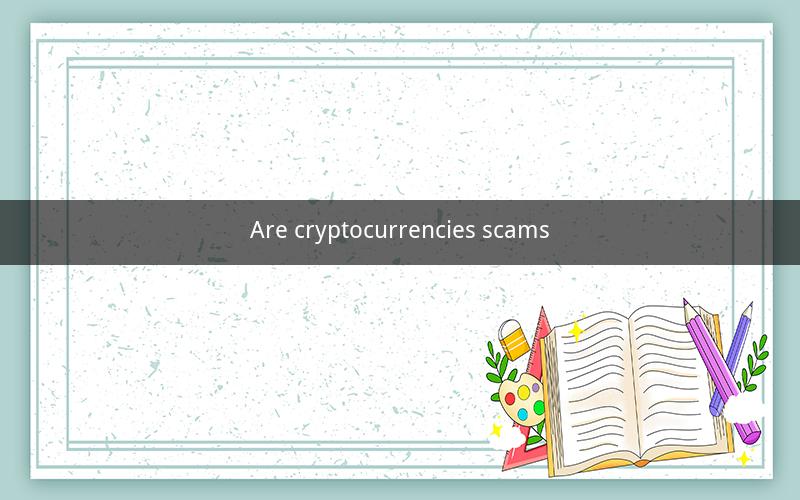
Directory
1. Introduction to Cryptocurrencies
2. Understanding Scams
3. Common Cryptocurrency Scams
4. Identifying Scams
5. Protecting Yourself from Scams
6. Legal Actions and Regulations
7. Conclusion
Introduction to Cryptocurrencies
Cryptocurrencies have gained immense popularity over the past decade, with Bitcoin being the first and most well-known example. These digital or virtual currencies use cryptography to secure transactions and control the creation of new units. However, with this rise in popularity comes a rise in scams targeting unsuspecting investors and users.
Understanding Scams
Scams are fraudulent activities aimed at deceiving individuals or organizations to obtain their money, personal information, or both. They can take various forms, including phishing, Ponzi schemes, and pyramid schemes. In the context of cryptocurrencies, scammers often exploit the lack of understanding and the allure of high returns to defraud victims.
Common Cryptocurrency Scams
Phishing Attacks
Phishing attacks involve sending fraudulent emails or messages that appear to come from reputable sources, such as exchanges or wallet providers. These messages often ask for personal information or prompt users to click on malicious links, leading to theft of funds or information.
Ponzi Schemes
Ponzi schemes promise high returns on investment with little to no risk. They rely on new investors' money to pay returns to earlier investors, creating the illusion of a successful investment. Eventually, the scheme collapses, leaving investors with substantial losses.
Pyramid Schemes
Pyramid schemes are similar to Ponzi schemes but involve recruiting new investors to join the scheme. Participants earn money by recruiting others, rather than from actual investments. As more people join, the scheme grows, but it eventually collapses due to a lack of new recruits.
Fake Exchanges and Wallets
Scammers often create fake cryptocurrency exchanges or wallets that look legitimate. They steal funds from users' accounts or use the stolen information to defraud them further.
Pump and Dump Schemes
Pump and dump schemes involve manipulating the price of a cryptocurrency by artificially inflating it, then selling off the coins at a higher price. Scammers typically buy a large amount of the coin, drive up the price, and sell off their coins before the price crashes, leaving unsuspecting investors with substantial losses.
Identifying Scams
Unusually High Returns
Be wary of investments promising unusually high returns, especially with little to no risk. High returns often indicate a scam.
Pressure to Act Quickly
Scammers often create a sense of urgency, pressuring victims to make quick decisions. Take your time to research and verify the legitimacy of the investment before committing.
Lack of Transparency
Avoid investments with a lack of transparency, including unclear ownership, contact information, and business model.
Unregistered Platforms
Be cautious of cryptocurrency platforms that are not registered or licensed in your jurisdiction.
Protecting Yourself from Scams
Research and Verify
Before investing, thoroughly research the company, product, or service, and verify its legitimacy. Check reviews, forums, and social media to see what others are saying about the investment.
Use Secure Platforms
Only use reputable exchanges and wallets that are well-established and have a good track record of security.
Be Skeptical of Unsolicited Offers
Be wary of unsolicited offers, especially those promising high returns with little risk.
Keep Your Information Secure
Use strong passwords, enable two-factor authentication, and be cautious when sharing personal information online.
Legal Actions and Regulations
Governments and regulatory bodies worldwide are taking steps to combat cryptocurrency scams. They are implementing laws and regulations to protect consumers and ensure transparency in the market. If you suspect you have been scammed, report the incident to the appropriate authorities.
Conclusion
Cryptocurrencies have the potential to revolutionize the financial industry, but they also come with risks. By understanding the common scams and taking steps to protect yourself, you can minimize your chances of falling victim to fraud. Always conduct thorough research, use secure platforms, and be skeptical of unsolicited offers to stay safe in the world of cryptocurrencies.
Questions and Answers
1. What is a phishing attack in the context of cryptocurrencies?
Answer: A phishing attack is a fraudulent attempt to obtain sensitive information, such as passwords or credit card details, by posing as a legitimate entity, such as an exchange or wallet provider.
2. What is a Ponzi scheme, and how does it differ from a pyramid scheme?
Answer: A Ponzi scheme is a fraudulent investment scam that pays returns to early investors using funds from later investors. A pyramid scheme relies on recruiting new investors to earn money, rather than from actual investments.
3. How can you tell if a cryptocurrency investment is a scam?
Answer: Be wary of investments promising unusually high returns with little risk, creating a sense of urgency, lacking transparency, and being offered through unregistered platforms.
4. What can you do to protect yourself from cryptocurrency scams?
Answer: Conduct thorough research, use secure platforms, be skeptical of unsolicited offers, and keep your personal information secure.
5. What should you do if you suspect you have been scammed?
Answer: Report the incident to the appropriate authorities and seek legal advice.
6. How are governments and regulatory bodies addressing cryptocurrency scams?
Answer: Governments and regulatory bodies are implementing laws and regulations to protect consumers and ensure transparency in the market.
7. What are some common red flags of a cryptocurrency scam?
Answer: Unusually high returns, pressure to act quickly, lack of transparency, and unregistered platforms.
8. How can you verify the legitimacy of a cryptocurrency exchange or wallet?
Answer: Check reviews, forums, and social media, and ensure the platform is registered and licensed in your jurisdiction.
9. What is a pump and dump scheme, and how does it affect investors?
Answer: A pump and dump scheme involves manipulating the price of a cryptocurrency, driving it up, and then selling off the coins at a higher price, leaving unsuspecting investors with substantial losses.
10. How can you stay informed about the latest cryptocurrency scams?
Answer: Follow reputable news sources, join cryptocurrency forums, and stay updated on the latest legal actions and regulations.